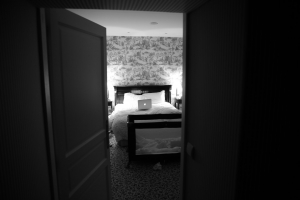Listen to this article
Sex, like all of God’s gifts, is good. “Every good and perfect gift is from above, coming down from the Father of the heavenly lights, who does not change like shifting shadows” (James 1:17), and one of the many gifts God gave humanity at the beginning was sex. As with all of God’s gifts, we can use them well for our blessing and flourishing, or they can be distorted, and become less than they were meant to be for us.
 We get many mixed messages about sex in our culture, and many of those messages don’t help us handle God’s gift well. In addition to that, several behaviors related to sex negatively affect our relationships, and some of these are compulsive and require the intervention or help of a mental health professional to restore a healthy outlook on sex. One such area is sex addiction.
We get many mixed messages about sex in our culture, and many of those messages don’t help us handle God’s gift well. In addition to that, several behaviors related to sex negatively affect our relationships, and some of these are compulsive and require the intervention or help of a mental health professional to restore a healthy outlook on sex. One such area is sex addiction.
Sex addiction is not listed as a diagnosable condition under the DSM-5 (Diagnostic and Statistical Manual for Mental Disorders), but it is nonetheless a serious condition. The term “sexual addiction” points to the fact that a person engages in compulsive sexual behaviors. Compulsive sexual behavior means that a person may significantly order or alter their life and activities so that they can perform sexual acts or indulge sexual thoughts throughout the day.
They are unable to control their behavior, despite the severe negative consequences that flow from it. Just like other addictions, the person can’t help themselves. Sexual addictions can come in many different forms, and these may include addiction to inappropriate behaviors such as exhibitionism or voyeurism, sexual acts, watching or consuming pornography, prostitution, masturbation, or sexual fantasies.
What Causes Sex Addiction?
The causes of compulsive sexual behavior aren’t entirely clear, but several possibilities have been explored. Among other potential causes, sex addiction may be due to a form of impulse control disorder. Additionally, the imbalance of naturally occurring brain chemicals (neurotransmitters) such as serotonin, dopamine, and norepinephrine which help to regulate your mood may be linked to compulsive sexual behavior.
 Hypersexual behavior has also been known to be caused by and be a symptom of some neurological disorders such as epilepsy or dementia. These health problems may cause damage to certain parts of the brain that affect sexual behavior. In some forms of mental illness like bipolar disorder, hypersexuality may be a symptom. The treatment of certain conditions such as Parkinson’s with dopamine agonist medication may also lead to hypersexual behavior.
Hypersexual behavior has also been known to be caused by and be a symptom of some neurological disorders such as epilepsy or dementia. These health problems may cause damage to certain parts of the brain that affect sexual behavior. In some forms of mental illness like bipolar disorder, hypersexuality may be a symptom. The treatment of certain conditions such as Parkinson’s with dopamine agonist medication may also lead to hypersexual behavior.
Sex Addiction Signs
How can one tell if they are struggling with sex addiction? It should be noted that enjoying sex isn’t one of the sex addiction signs. As we pointed out earlier, sex is one of God’s gifts to us, and deriving enjoyment from it is one of its blessings. Sexual addiction, like many other addictions, causes problems in relationships, along with challenges in mental, physical, and emotional health. A few sex addiction signs include:
Inability to control sexual behavior despite negative consequences. If you find that your sexual behavior is problematic, but you just can’t seem to stop indulging in it despite the negative consequences that flow from your behavior,
Secrecy about your sexual behavior and lying to cover it. When you find yourself hiding what you’re doing sexually from your spouse or an accountability partner, that is a sign of trouble.
Compulsive sexual thoughts, urges, and fantasies. If your mind and fantasies are dominated by thoughts of having sex, sexual imagery, and scenarios, and you’ve tried unsuccessfully to reduce or control your sexual fantasies, urges, or behavior, that compulsive behavior may signal sexual addiction.
Inordinate amounts of time spent thinking about and seeking ways to have sex. If much of your time is taken up with thinking about and looking for ways to masturbate or have sex, it’s quite likely you may have a sexual addiction. You may find that sexual thoughts and the pursuit of sexual activity take precedence over other things that are part of the daily stuff of life, work, and relationships.
 Personal and professional relationships suffering. If your thoughts and time are focused on sexual fantasies, and pursuing sexual activity, your relationships may suffer as a result. If you find you’re missing deadlines, having affairs, or otherwise compulsively engaging in thoughts and behaviors that undermine your relationships, you may have a sexual addiction.
Personal and professional relationships suffering. If your thoughts and time are focused on sexual fantasies, and pursuing sexual activity, your relationships may suffer as a result. If you find you’re missing deadlines, having affairs, or otherwise compulsively engaging in thoughts and behaviors that undermine your relationships, you may have a sexual addiction.
Engaging in risky sexual behavior despite dangers. Sexual addiction can drive behaviors that are risky, illegal, and otherwise dangerous. If you find yourself compulsively engaging in behaviors such as unprotected sex, soliciting sex workers, having sex with strangers and multiple partners despite the dangers inherent in these behaviors, that may signal sexual addiction.
Having lots of sex but deriving little pleasure from it. With sexual addiction, your sexual adventures may often result in regret, shame, depression, and anxiety. In other words, while feeling compelled to engage in sexual activity, it doesn’t leave you feeling satisfied or fulfilled, as lawful, healthy, and meaningful sexual activity should. Instead, sexual addiction leaves a person feeling empty, ashamed, and guilty after engaging in sexual activity.
Using sex to reduce stress, anxiety, or to escape isolation. If you find that you often use sex for this purpose, that may also signal sexual addiction.
Treatment and Outlook for Sexual Addiction
Sexual addiction, like other addictions, can be managed and overcome. It’s important to see a mental health professional so they can assess your symptoms and history. While sexual addiction isn’t diagnosable under the DSM-5, a mental health professional can nonetheless help to determine what the situation is and chart a way forward for your treatment. Find a Certified Sexual Addiction Therapist (CSAT), a psychologist, or a psychiatrist for help.
Treatment for sexual addiction will likely vary based on the underlying cause of it, but it will typically be conducted on an outpatient basis with the use of counseling and behavioral therapies. Some of these include Cognitive Behavior Therapy (CBT), which is a form of talk therapy.
 Through one-on-one sessions with a licensed mental health therapist, CBT can help a person by identifying their triggers for sexual impulses, help them become aware of unhealthy thought patterns, and teach them to alter their behaviors towards healthy ones. Other therapies that may be deployed also include eye movement desensitization and reprocessing (EMDR), and psychodynamic therapy.
Through one-on-one sessions with a licensed mental health therapist, CBT can help a person by identifying their triggers for sexual impulses, help them become aware of unhealthy thought patterns, and teach them to alter their behaviors towards healthy ones. Other therapies that may be deployed also include eye movement desensitization and reprocessing (EMDR), and psychodynamic therapy.
These can take place within either an individual or group therapy context. There are also support groups that can help with one’s recovery from sexual addiction. In some circumstances, couples counseling or marriage counseling may be needed to help restore a relationship that’s been damaged by sexual addiction.
Some programs such as Sex Addicts Anonymous (SAA) are 12-step programs that follow the same recovery model as Alcoholics Anonymous (AA), and they can help address sex addiction through group meetings that provide a good support and accountability system.
In addition to out-patient treatment, there are some in-patient treatment options one can take advantage of to recover from sexual addiction. In these programs, a person with sex addiction signs is removed from their regular routine and daily life for at least thirty days to help them regain control over their impulses and begin the process of healing. Such programs usually include in-depth individual and group therapy sessions to address the underlying issues as well as effects of sexual addiction.
In addition to the therapies mentioned above, if the sex addiction presents alongside or is associated with an underlying anxiety disorder or mood disorder, the treatment plan may also include medications that will be prescribed by a doctor.
Currently, there are no medications specified or recommended to treat sex addiction outside of these clinically classified disorders. While antidepressants may work to reduce sexual urges, these will be prescribed to address anxiety and mood disorders which often go with sexual addiction and not sexual addiction per se.
“Figure Toys Hugging”, Courtesy of Gaelle Marcel, Unsplash.com, CC0 License; “Young Man With Laptop”, Courtesy of Grzegorz Walczak, Unsplash.com, CC0 License; “Bedroom”, Courtesy of Amaru CAZENAVE, Unsplash.com, CC0 License; “Back to Back”, Courtesy of Anastasia Shuraeva, Pexels.com, CC0 License








